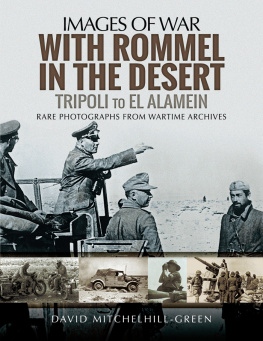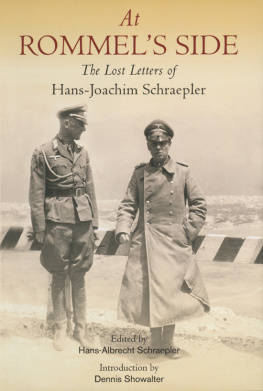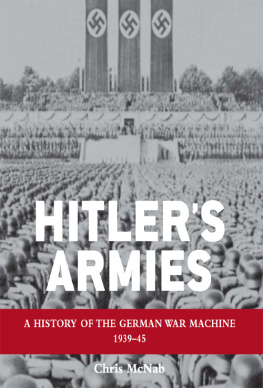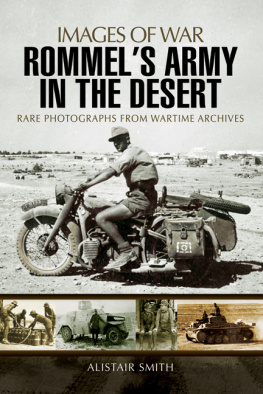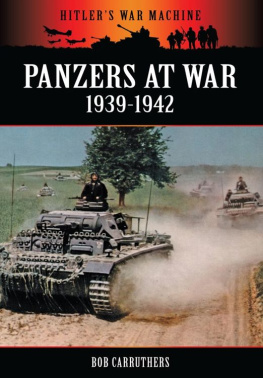Hitlers War in Africa 19411942
Theres a Devil in the dawnSee him fawn on those who served him well, Who blinded, deafened, breathed the cordite reek, Fed the ravening guns, and swore that it was hell .
F.E. Hughes, Bombardier
There are flowers now, they say, at Alamein; Yes, flowers in the minefields now. So those that come to view that vacant scene, Where death remains and agony has been Will find the lilies growFlowers, and nothing that we know .
John Jarmain (51st Highland Division)
Hitlers War in Africa 19411942
The Road to Cairo
DAVID MITCHELHILL-GREEN
First published in Great Britain in 2021 by
PEN AND SWORD MILITARY
An imprint of
Pen & Sword Books Limited
Yorkshire Philadelphia
Copyright David Mitchelhill-Green, 2021
ISBN 978 1 52674 436 4
eISBN 978 1 52674 437 1
Mobi ISBN 978 1 52674 438 8
The right of David Mitchelhill-Green to be identified as Author of this work has been asserted by him in accordance with the Copyright, Designs and Patents Act 1988.
A CIP catalogue record for this book is available from the British Library.
All rights reserved. No part of this book may be reproduced or transmitted in any form or by any means, electronic or mechanical including photocopying, recording or by any information storage and retrieval system, without permission from the Publisher in writing.
Pen & Sword Books Limited incorporates the imprints of Atlas, Archaeology, Aviation, Discovery, Family History, Fiction, History, Maritime, Military, Military Classics, Politics, Select, Transport, True Crime, Air World, Frontline Publishing, Leo Cooper, Remember When, Seaforth Publishing, The Praetorian Press, Wharncliffe Local History, Wharncliffe Transport, Wharncliffe True Crime and White Owl.
For a complete list of Pen & Sword titles please contact
PEN & SWORD BOOKS LIMITED
47 Church Street, Barnsley, South Yorkshire S70 2AS, United Kingdom
E-mail:
Website: www.pen-and-sword.co.uk
Or
PEN AND SWORD BOOKS
1950 Lawrence Rd, Havertown, PA 19083, USA
E-mail:
Website: www.penandswordbooks.com
Acknowledgements
I am indebted to many individuals for their valued assistance in this project. Veterans, now passed, and their families, kindly provided personal diaries, post-war recollections and wartime snapshots gritty and imperfect, yet sober and realistic in their depiction of the Desert War. Thank you: Richard Weston, A.C. Fletcher, F.M. Paget, Frank G. Perversi, J.H. Flak, Heinz Becker, Kurt Sawall and Melanie Ashfield. Other individuals who assisted through their expertise in the Second World War include: Richard Hargreaves, Honza Kase, Bertram Nold, Peter Jason Lai, and Suranjan Das. A special thank you to Akhil Kadidal for allowing me to use his maps of the North African campaign and Mr Owen Niall for providing an insight into contemporaneous surgery. To the individuals working in archives and libraries in UK and Australia, I am most grateful. My heartfelt appreciation is extended to Roni Wilkinson, Heather Williams, Amy Jordan and Matt Jones at Pen & Sword for their enthusiasm in bringing this book to life. Finally, I dedicate this book to my exceptionally supportive family Jenny, Harvey and Hana.
Abbreviations
| ADC | Aide-de-Camp |
| AFS | American Field Service |
| AIF | Australian Imperial Force |
| AWM | Australian War Memorial |
| BBC | British Broadcasting Corporation |
| BEF | British Expeditionary Force |
| C-in-C | Commander in Chief |
| CIGS | Chief of the Imperial General Staff |
| CRA | Commander of the Royal Artillery |
| DAK | Deutsches Afrikakorps (German Africa Corps) |
| DCM | Distinguished Conduct Medal |
| Div | Division |
| GOC | General Officer Commanding |
| GHQ | General Headquarters |
| HQ | Headquarters |
| NZEF | New Zealand Expeditionary Force |
| OKW | Oberkommando der Wehrmacht (High Command of the German Armed Forces) |
| PoW | Prisoner of War |
| RAF | Royal Air Force |
| RASC | Royal Army Service Corps |
| RHA | Royal Horse Artillery |
| RN | Royal Navy |
| RTR | Royal Tank Regiment |
| RVNR | Royal Volunteer Naval Reserve |
| SAAF | South African Air Force |
| SAI | South African Infantry |
| VC | Victoria Cross |
Foreword
Signal was a popular illustrated German propaganda magazine produced during the Second World War. In mid-June 1941 a diary account of fighting along the Egyptian frontier was published:
The last golden glow of the setting sun fadesEverything fine. Am fit and well. Im glad I was there when the British were given the thrashing they deserved at Sollum.
The piece was later translated and circulated in a British Army publication with the comment from General Sir Claude Auchinleck: These fellows are good soldiers; they know their job and mean to do it I hope well have him under the sand or in the bag before long.
This is the story of these soldiers, fighting across North Africa from late December 1940 until the beginning of November 1942. It begins with Hitlers decision to intervene and reinforce Mussolinis vanquished army, and concludes with the defeat of the Deutsche-Italienische Panzerarmee at El Alamein in early November 1942. It explores the experiences of the Axis and British coalition armies conspiring to kill, while simultaneously battling rampant disease, fluctuating morale, technological disparity, leadership shortfalls, and a hostile environment.
We follow an ill-prepared German army thrust into an unforgiving desert landscape for which its European machinery was never designed, its diet compromised, its ally reeling from recent defeat. Driven in part by a sense of adventure and the lure of the Nile, its commander, Generalleutnant Erwin Rommel, boldly led his men across vast swathes of empty desert in an ambitious quest to drive the British from Egypt. But in a theatre of secondary importance, Rommel would become increasingly reliant upon captured vehicles, weapons and stores. Supply would be a constant headache. In this arid arena, bitterly contested battles, won or lost without a decisive outcome, forced victor and vanquished back and forth many hundreds of miles across the Western Deserts coastal plain. Here the rules of desert warfare intervened bringing one side closer to its supply hub; its enemys lines of communication correspondingly overextended. Eventually a bloody war of attrition ground Rommels coalition army to a halt just 160 miles from Cairo the zenith of Hitlers war in North Africa.
*****
Although it may be offensive to some today, I use the term British in its contemporary context to represent Commonwealth and Empire troops drawn from India, Australia, New Zealand and South Africa. Specific formations are identified by their country of origin. Imperial measurements will be used, in keeping with the period for British forces, as will inconsistencies in spelling and grammar that feature in quotations. Contemporary labels such as Wog, Wop or Hun derogatory and hateful to todays reader have been retained for historical accuracy.


